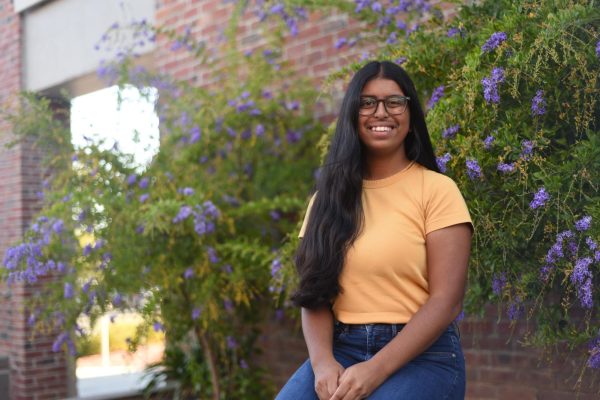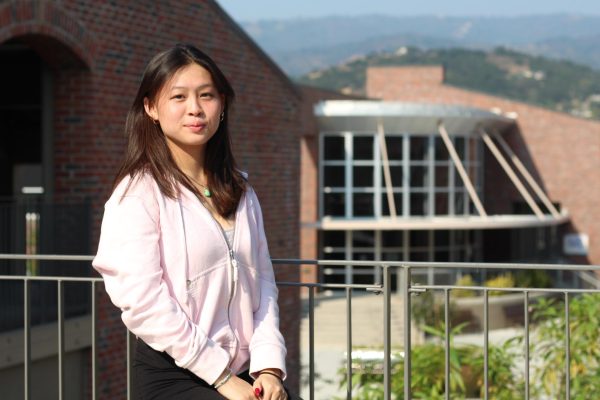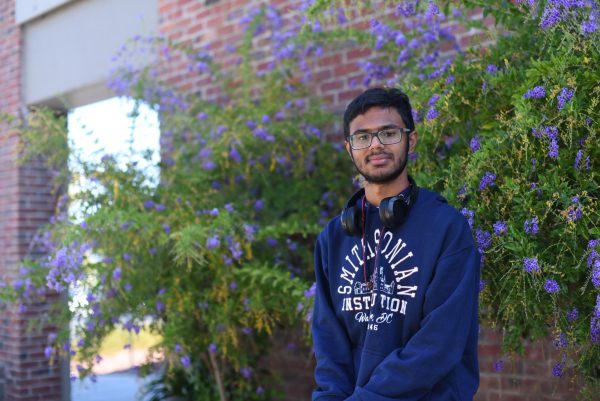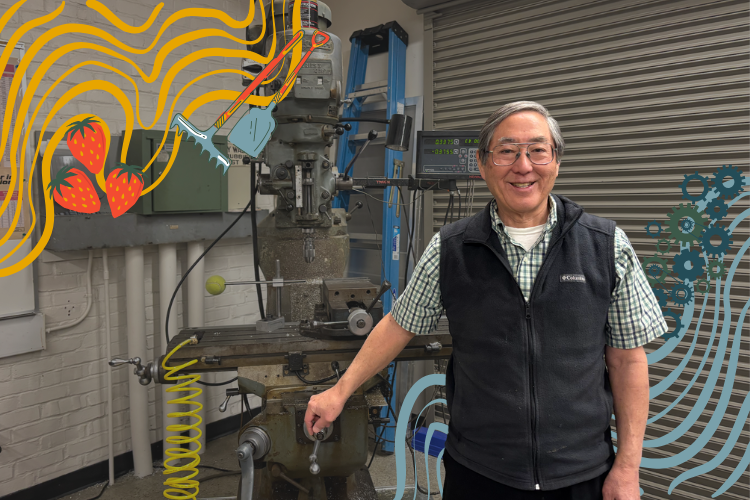Opposition to APEC
EE: On Sunday, Nov. 12, protestors lined up in San Francisco to march down Market Street, towards the Moscone Center, where the Asia-Pacific Economic Cooperation (APEC) summit was being held. Protestors from various groups gathered to unite against the summit, largely due to their opposition towards world leaders gathering there. One of the protesters was KC Ho, a member of the Chinese Progressive Association in San Francisco.
KC Ho: I’m with the Chinese Progressive Association here in San Francisco — we were founded in 1972. We educate, empower and organize Chinese immigrant working class families for social justice for all of us and for liberation. We are allies with a lot of other groups who are here today. So there are Filipino groups, other working class communities of color who are here today and we’re here to say no to APEC, because we know that militarization and trade deals and policies like these hurt working people, hurt women, hurt workers everywhere — in San Francisco and everywhere else as well.
EE: Naz, a protestor from Bangladesh, also protested APEC on behalf of the International Migrant Alliance, based on their experience and history with exploitation. They agree with Ho that APEC harms workers worldwide.
Naz: APEC continuously disrespects laborers all around the world, tries to work a profit, tries to press and pinkblush all of their policies and all of their propaganda [that] they place all around San Francisco to try and act like what they do and what they work for is equity and some sort of environmental progress when in reality, we see right through it. All of our families and even ourselves, in these cities where we have had to move from our home countries, we witness the exploitation and we realize that the benefits that we are not receiving at work are going straight into the pockets of the people who are profiting from our labor.
EE: Growing up in a working class family in NYC, Ho has experienced the impact of policies that directly target immigrant families.
KC Ho: My family and I are immigrants from Hong Kong so I grew up in a working class family where we know that actually, a lot of workers’ rights are not respected. I saw my dad work in Chinatown in New York City, six days out of the week, so he could put food on the table for us. And when I got older, I realized that there are deliberate policies by corporations that prioritize profits over people. And that people like my parents are people caught up in capitalism, in bad working conditions, then we learn that actually bad working conditions are deliberately like that, and not just in one place, but in other places as well.
EE: Similarly, Naz has also found that the harmful impacts of APEC and similar organizations extend beyond one place or issue.
Naz: All of these protests that work against corporations and exploitation are all connected, so anywhere from Free Palestine to moving against APEC, they’re all connected in order to fight back against imperialist powers. The exploitation is taking all of their guidance straight from Western powers and imperialist power handbooks, putting all of the labor again, foreign workers, agricultural workers, and putting all that profit into another area that isn’t directly benefiting the farmworkers themselves. They will accept our labor but they won’t accept our humanity. That’s a story that we keep hearing all over the world.
EE: These issues aren’t just perpetuated by APEC abroad — Ho says that through her work, she has seen them impact people’s everyday lives.
KC Ho: I learned about APEC probably several months ago. I didn’t know anything about it other than it’s a summit coming to town. At work, we had guest speakers who are much more familiar with the issue come do a teach-in where they explain to us what is APEC, what is APEC’s historic impact on working people across the globe and that’s when I got to understand more about how it connects to all the other issues that I work day to day with our members on right when they come to us, when community members come to us being like, ‘Hey, I work at some small restaurant and my boss isn’t paying me on time. I think that’s wrong. Can you all help me and do something about that?’ That connects to how we have entire families of three generations living in a single room occupancy unit, which are called SRO hotels in Chinatown. They’re really rundown housing conditions. Small rooms, that’s ten by ten square feet, in Chinatown, where because of the economic conditions, some of which are created by things like APEC, the economy is so unsustainable that our own people have to shove eight, nine people in one room, where they have to share bathrooms and kitchens with the entire floor, because they’re stuck in low wage jobs. So it’s horrible for our government to say that there’s no money and there’s no intention to support a ceasefire, to fund health care, schools, better work conditions for our people, and instead they’re funding all the money to militarism abroad.
EE: However difficult living conditions may be, KC says many families simply accept it because they don’t feel they have any other options.
KC Ho: A lot of our members think, ‘Oh, well, life is gonna be this hard, because I don’t know English. I’m an immigrant. I’m not highly educated. So I can only take jobs that are bad conditions that exploit me, even if I know that I deserve better protections.’ And our job as organizers is to say, ‘actually, a lot of people face these conditions. It’s not your fault.’ And these conditions are created in systemic forces that impact workers everywhere. And those are some of the same forces that are at play when APEC meets this whole week. And so we’re here to say no to that and help our members make a little more sense to understand that a little bit deeper with every action that we go to. There is no one coming to save us — we are the change we’ve been waiting for.
Benefits of APEC
EE: On Friday, Nov. 17, the Asian Pacific American Leadership Foundation, also known as APALF, held a leadership retreat for AAPI elected officials at the APEC conference in San Francisco. APALF Chief Operations Officer Eddie Shiomi, who helped organize the event, said APALF took advantage of APEC’s magnitude to increase attendance for their own summit, CALNET.
ES: We weren’t involved directly with the APEC summit, but because we knew a lot of folks were gathering and coming for that, a lot of people, including us, hosted events that were tangential to that because we could bring people into our event as a result. The whole slew of people who normally wouldn’t come to the California event came out as we announced and launched or planned the launch of our national APALF. It was awesome. It was really amazing.
EE: To Shiomi, this success was especially encouraging because the summit was the first time APALF expanded to include national elected officials rather than localized groups.
ES: Right now, I would say that AAPI electeds and appointeds are relatively disconnected from each other. We have a states rights system in this country, and largely people stay within their states. A lot of state legislatures are very different. What we’re hoping to do is to have these people meet and get to know each other, and share best practices like how to be a better elected official. All these kinds of things that happen when people can convene.
EE: A large part of this disconnect, Shiomi says, is because most legislatures are predominantly white or Black, isolating the few Asian representatives within their respective legislatures.
ES: Part of your identity certainly is race and ethnicity and that’s important, and it’s pretty lonely out there. We want elected officials from the AAPI background to just feel like they’re not alone, that they have others in the system that are in the same positions that may be more seasoned and could mentor them. There’s people that have been there 10 cycles and can tell you exactly how to navigate the first 100 days and how to hire people and how to read a bill. We’re lowering the bar in terms of connecting and hopefully delivering services and resources and a network that was not there before.
EE: With APALF going national, Shiomi reiterates that he believes APALF’s track record sets it up for future successes.
ES: Our goals are basically to bring people together so that they know each other. One, they’re aware and two, they can be supportive of each other. We have experience doing this over 20 something years in California and we want to bring this national and show that we can do it.
Correction (Jan. 8, 9:44 a.m): Changed from ‘stop a ceasefire’ to ‘support a ceasefire’ to clarify Ho’s statement.



















